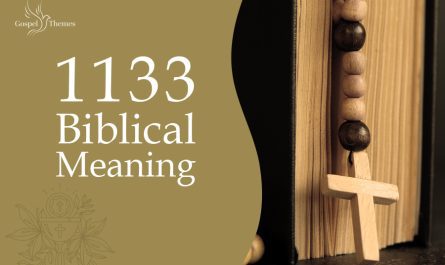The blowing of the shofar is an ancient practice that holds a deep significance in the Bible, the Jewish tradition and other religions in general. The biblical meaning of blowing the shofar holds a special message, and people still use it today to cherish their cultural beliefs and traditions.
This unique instrument marks sacred occasions, signals important events and awakens spiritual awareness in the hearts of those who hear it. Many segments in the Old and New Testament describe the shofar blowing as a symbol of reunion, victory and repentance.
Because of its intriguing history and sound, we will explore the biblical meaning of the shofar, examining its historical roots, spiritual significance, and enduring importance in the Christian faith.

Biblical Meaning of Blowing the Shofar
The shofar is mentioned numerous times in the Bible, particularly in the Old Testament, where it is connected to important events in Christianity.
One of the most significant biblical meanings of blowing the shofar is as a call to repentance. It is used to awaken people from their spiritual slumber and remind them of their need to turn toward God. The shofar was used as a call to gather together, particularly on holy days and festivals.
In addition to its spiritual significance, the shofar is also used to commemorate historical events, such as the giving of the Torah at Mount Sinai. It is also a symbol of victory, particularly in times of war.
Blowing the shofar for a sense of community
One of the main uses of the shofar throughout the Bible is to call people to gather for important events, such as religious ceremonies or times of war.
In the Bible, Numbers 10:2-7, God commands Moses to make two silver trumpets to serve as a sign to assemble.
“Make two trumpets of hammered silver, and use them to call the community together and set out the camps. When both are sounded, the whole community is to assemble before you at the entrance to the Tent of the Meeting. If only one is sounded, the leaders–the heads of the clans of Israel–are to assemble before you.”
In other words, this use and interpretation of the shofar as a call to assemble reminds us of the importance of coming together as a community, whether to celebrate or mourn, seek forgiveness, or show solidarity.
Proclaiming the presence of God
One of the holiest biblical meanings of blowing the shofar is to signal the presence of God. In Exodus 19:16, the sound of a shofar preceded God’s appearance to the Israelites at Mount Sinai.
“On the third day, as morning dawned, there was thunder, and lightning, and a dense cloud upon the mountain, and a loud blast of the horn; and all the people in the camp trembled.”
The blowing of the shofar, the thunder, and the lighting announce the arrival of God and the beginning of the revelation of the Ten Commandments.
In the Bible, the sound is described as a powerful and awe-inspiring signal to the Israelites that they were in the presence of God and that something important was happening.

Biblical meaning of blowing the shofar and the victory
Many stories throughout the Bible show that they used the shofar as a battle cry to signal the Israelites to go to war (Joshua 6:4-20). The story was about Joshua, who ordered seven priests to carry rams’ horn trumpets ahead of the ark.
On the seventh day, they should march around the city seven times while blowing the trumpets.
When a long blast is sounded, the entire army should shout, causing the city walls to collapse and allowing the army to enter straight ahead.
Also, the shofar blowing was often used to announce victory in battles, as in the verses of Judges 7:15-23.
“Watch me,” he told them. “Follow my lead. When I get to the edge of the camp, I do exactly as I do. When I and all who are with me blow our trumpets, then from all around the camp blow yours and shout, ‘For the Lord and for Gideon.‘”
In this passage, Gideon leads his army of three hundred men to defeat the Midianites by using trumpets and empty jars to create a loud noise that confuses and scares the enemy. The blowing of the horns and the breaking of the jars signal all the Israelites to attack the Midianite camp, and with God’s help, they were victorious.
Below is a video where you can hear the actual sound of victory coming from a shofar.
Blowing the shofar as a call to repentance
Blowing the shofar in the Bible is often related to repentance and forgiveness. If you hear the shofar sound, you must repent for your sins and ask God for forgiveness.
Book of Joel 2:1 ‘’ Blow the ram’s horn in Zion; sound the alarm on My holy mountain! Let all who dwell in the land tremble, for the Day of the LORD is coming; indeed, it is near’’
In these verses from the Book of Joel, blowing the shofar is associated with a wake-up call for people to prepare for the ‘’Day of the Lord’’ and turn to God with all their hearts and faith.
The return of the Messiah
In the New Testament, the shofar blowing is associated with the return of Jesus Christ. In 1 Thessalonians 4:16, it says:
“The Lord himself will come down from heaven, with a loud command, with the voice of the archangel and with the trumpet call of God, and the dead in Christ will rise first.”
Also, the Apostle Paul writes, “In a moment, in the twinkling of an eye, at the last trump: for the trumpet shall sound, and the dead shall be raised incorruptible, and we shall be changed” (1 Corinthians 15:52).
Here, Paul speaks of a “last trump,” which many Christian believers refer to as the shofar and which will signal the return of Christ and the resurrection of the dead.
This biblical reference is a powerful reminder of the hope and anticipation that comes with the promise of a savior who will end suffering and restore peace and justice to the world.
The shofar calls us to introspection, repentance, and spiritual awakening, reminding us of our duty to prepare ourselves for the coming of the Messiah and the establishment of God’s kingdom on earth.
The beginning of a season
The shofar blowing was often used to signal the beginning of a new season or year. This remarks a possibility for new beginnings and opportunities.
Biblical Meaning of Blowing the Shofar in Different Religions

The blowing of the shofar is also adopted by other religions for its symbolic and spiritual guide. Here are some examples:
Judaism
The shofar is an important part of Jewish religious services, especially during the High Holy Days of Rosh Hashanah and Yom Kippur. The shofar’s sound is meant to awaken worshippers to the need for repentance and self-reflection and inspire them to renew their commitment to God and the Jewish faith.
Islam
Although the shofar is not used in Islamic worship, it is mentioned in the Quran as a reminder of the covenant between Allah and the Children of Israel. Some Islamic scholars have interpreted the shofar’s sound as a warning of the Day of Judgment, when all souls will be called to account for their deeds.
Other religions
In some African and Afro-Caribbean religions, the shofar is part of spiritual ceremonies and rituals. In the Yoruba tradition of West Africa, the shofar is used to call forth the Orisha spirits during certain ceremonies. In Haitian Vodou, the shofar, used with other instruments, calls forth the Loa spirits.
In Native American Church and certain New Age or pagan traditions, the shofar may symbolize primal power, spiritual awakening, or connection to the natural world in these contexts.
Overall, the use and meaning of shofar vary significantly across different religions and cultures. While it is most commonly associated with Jewish religious practices, shofar’s use and significance trace back to ancient times.
Spiritual Meaning of Blowing the Shofar
The shofar has deep spiritual significance in Jewish and Christian traditions. Blowing the shofar is often associated with spiritual awakening, repentance, and the start of a new year or new chapter in life.

Here are some of the spiritual meanings associated with blowing the shofar:
Awakening
The shofar’s sound is believed to awaken the soul and remind us of our spiritual purpose. It is often blown to remind people to humble down and trust the universe and the power of God.
Connection to the divine
Over time, the shofar became an important symbol of connection to the divine. It is said that the sound of the shofar is a call to repentance and a reminder of the importance of returning to one’s true self.
When the shofar is blown, it signals the community to come together and connect to God.
It is said to be the sound of God’s voice, and blowing the shofar is a way to communicate with the divine and express our devotion.
Humility and repentance
The shofars’ sound represents the soul’s cry as it seeks forgiveness and redemption. It is also a symbol of humility and authenticity.
By blowing the shofar, we are reminded to put aside our egos, be good and honest with ourselves and others, and approach life with a spirit of openness and vulnerability.
Proclamation
In some traditions, the shofar is blown to announce important events, such as the start of a new year or the arrival of a king. Blowing the shofar is a way of proclaiming the moment’s significance and acknowledging the divine presence in our lives.
Sense of unity
Blowing the shofar is often done in the community, and it is a way to bring people together in prayer and celebration. Its sound is meant to unify us and remind us that we are all part of a larger spiritual community.
The sound of our conscience
The sound of a shofar is a call to conscience for everyone, regardless of their religious beliefs. In a world filled with injustice, inequality, and suffering, the shofar reminds us that we all have a responsibility to stand up for what is right and start manifesting a better future for ourselves and future generations.
Frequently Asked Questions
Who blows the shofar in the Bible?
In the Bible, priests or Levites blow the shofar during religious ceremonies and events, such as the Feast of Trumpets and the Day of Atonement. Joshua and his army also blow it during the Battle of Jericho to signal victory.
Where was the shofar mentioned in the Old Testament?
Some of the most important mentions of the shofar in the Old Testament are signaling and alerting in times of war and as an instrument of God. In some parts of the Bible, the shofar was God`s voice.
“Then the LORD will appear over them; his arrow will flash like lightning. The Sovereign LORD will sound the trumpet…” (Zechariah 9:14).
Conclusion
The Biblical meaning of blowing the shofar is a significant act in the Bible that symbolizes many things. The shofar’s sound represents a call to repentance, a proclamation of freedom, a warning of judgment, and a celebration of victory.
It is a reminder of God’s presence and power and a signal for His people to gather and focus on Him. Also, the shofar reminds us of our ancestors’ sacrifices and God’s faithfulness throughout history.
We all need to take a moment and appreciate this majestic sound because its significance and notes have existed for thousands of years, and it continues to inspire and uplift us today.

 by
by 

